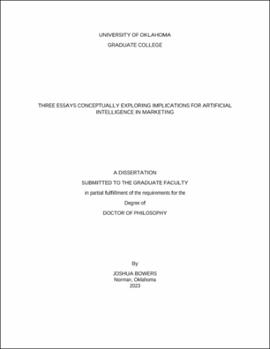| dc.description.abstract | This dissertation comprises three essays that conceptually explore the implications of artificial intelligence (AI) in marketing. AI is increasingly becoming integrated into every facet of marketing. As AI reshapes marketing relationships, it provides a path forward toward developing, adopting, or adapting conceptual frameworks, measurements, decision-making logics, and processes to reflect the digital world. Each of the three essays focuses on different facets of marketing utilizing distinct theoretical frameworks, research contexts, and methods. Essay one focuses on text-based communications, essay two focuses on AI personalized environments; whereas, essay three focuses on the new product development process of a business-to-business (B2B) AI marketing firm. These essays advance theory and practice to help us understand the implications of AI in marketing.
In essay one, I provide an evidence-informed answer to the following question: How are text-based communications in the echoverse reshaping marketing tasks and objectives? Given that automated textual analysis (ATA) methods are the window through which scholars and practitioners understand, predict, and co-create text-based communication in the echoverse, a systematic literature review of the marketing literature employing ATA methods is conducted. In doing so, a novel sampling procedure that applies supervised machine learning to rank long-form text assets in terms of relevancy is developed, which was used to identify empirical articles that employed ATA to gain marketing insights and predictions in the echoverse. The synthesis reveals how text-based communication reshapes four key marketing objectives: amplifying and de-amplifying content, tuning content, leveraging product reviews, and enhancing brand performance.
In essay two, I introduce a central concept from the field of ecology— ecological specialization—the breadth of a specie’s utilization of resources to the field of marketing and provide a typology of personalized digital environments. Specifically, I conceptualize how the resources within a firm’s content library interact with the degree of personalization to curate their digital marketing environment. Using a proprietary dataset including 7,174 email subscribers who opted to receive email marketing communications and opened at least one email between January 1, 2018, and June 30, 2018, from an Artificial Intelligence (AI) email marketing company that employs topic modeling to identify, curate, and deliver personalized emails to each individual customer based on customers’ observed preferences, the concept of specialization, along with its implications for AI-personalized digital environments, was examined. I show how the underlying assumptions of traditional marketing metrics may limit marketers’ ability to understand AI-personalized environments. The paper provides recommendations to marketers and new pathways for future research.
In essay three, I add the possibility of pivots to popular Stage-Gate® new product development processes (NPD). As conceived and operationalized with Stage-Gate®, one of five outcomes are possible decisions at each gate: go, stop, hold, recycle, or iterate. Borrowing from the entrepreneurship literature, I modify the process to include a sixth possible decision, a pivot. Pivots are triggered when a NPD project yields negative information or management believes that changes are necessary for the organization’s survival and growth, i.e., a continuation decision in a failing course of action—an escalation of commitment. Effectuation theory is used to understand how causal/effectual logic informs escalation of commitment decisions, including pivots in an organization’s NPD process. Through integrating the literature on Stage-Gate® NPD processes, entrepreneurial pivots, escalation of commitment theory, and effectuation theory, as well as using a case study of a business-to-business AI marketing organization’s NPD project with pivots, research propositions are offered for future research. | en_US |
